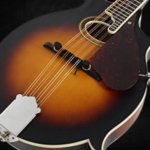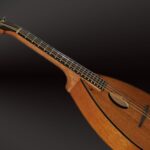When you’ve outgrown your first banjo, it’s time to take a look at the best intermediate banjos out there. In this article, I’m here to give you ideas about what to look for when you’re shopping around for a new instrument.
My name’s Ryan Burns. I’m a banjoist and songwriter from Chicago, Illinois, who’s been playing and teaching banjo for the past 10 years. I studied music at the University of Illinois, attended the Bela Fleck Blue Ridge Banjo Camp, and studied under Greg Cahill.
Quick Look: Best Intermediate Banjo
★ #1 Best Intermediate Banjo Overall: Gold Tone BG-150F ★
- Best Cheap Intermediate Banjo: Gold Tone CC-100R
- Best Intermediate Banjo Under $1,000: Recording King RK-R35
- Best Intermediate Banjo for Bluegrass: Recording King RK-R35
- Best Intermediate Banjo for Clawhammer: Gold Tone Maple Mountain
I’m hoping that this article will give you all the tools you need to find the best banjos out there, no matter where you are in your journey. Thanks for reading!
Banjos
What Is an Intermediate Banjo?
The banjo is an amazing instrument that originated in various African cultures and was taken to the Americas in the Transatlantic Slave Trade. Over the course of history, it became one of the most popular instruments in American culture and is now integral to country, folk, and bluegrass music.
Modern examples of the instrument feature a drumhead stretched over a metal and wood rim, a long neck, and steel or nylon strings stretched over a wooden bridge. This unique construction creates a twangy sound that’s instantly recognizable.
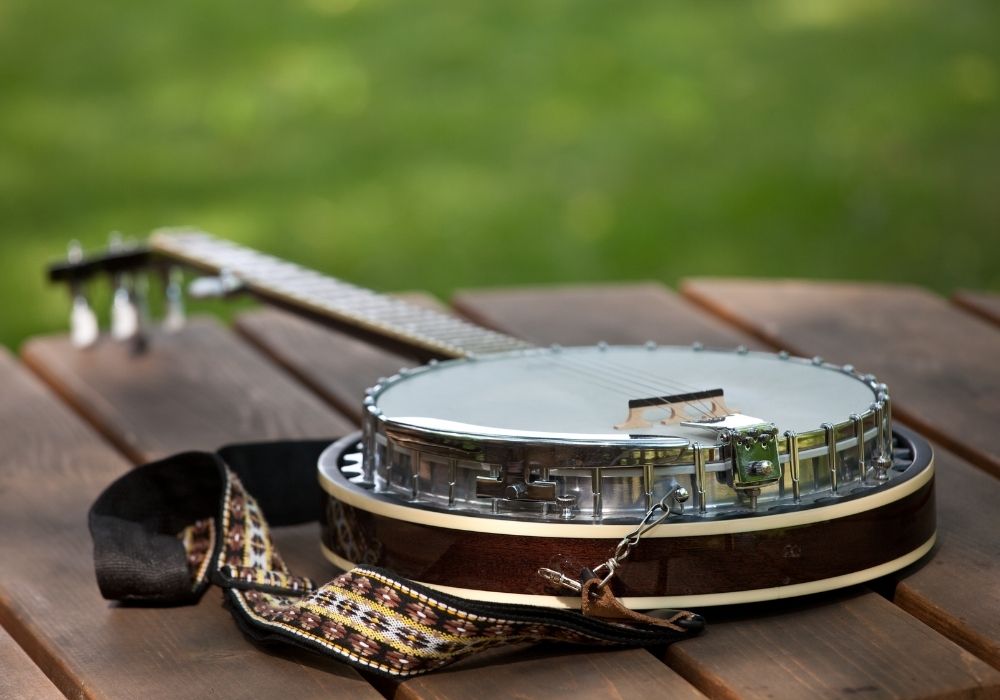
Intermediate banjos start to feature many of the construction techniques and materials from professional banjos, while keeping the styling a bit simpler. With less time and money spent on elaborate inlays and finishes, the makers can focus on solid materials and sound.
What’s the Difference Between Beginner, Professional & Intermediate Banjos?
There are many differences between the different levels of banjo. The different parts and materials, who is making them, and even just the brand on the headstock can affect whether your banjo is for beginners, professionals, or intermediate players.
- Beginner: Banjos for beginners tend to be lighter-weight, mass-produced, and made from cheaper materials. They’re a great way to test the waters before making a big investment in a more solid instrument.
- Intermediate banjos: An intermediate banjo is for players who know they want to stick with banjo, but aren’t yet willing or able to drop the money on a professional banjo. They usually have tone rings and all the other parts of a professional instrument but are more simply styled and still might be mass-produced.
- Professional: When a professional player buys a banjo, they’re looking for a solid, heavy, and handcrafted instrument. These banjos have intricate detailing, precision machining, and a strong pedigree with lots of volume and pop in the sound.
Types of Intermediate Banjos
There are a whole lot of types of banjos an intermediate player could buy, depending on the style of music they want to play. Make sure to research the style of instrument you might need before buying.
Resonator (Bluegrass)
When most people think about the sound of a banjo, the 5-string resonator banjo is likely what they’re hearing. They have a wooden resonator behind the pot to amplify the sound and should have a pop to cut through the rest of the band. They’re usually played with three fingerpicks in the bluegrass style.
Open Back (Clawhammer)
Open back banjos are primarily used in old-time folk music and played in the clawhammer style. They have five strings, no resonator, and can either have steel or nylon strings.
Tenor/Plectrum
Tenor and plectrum are two styles of 4 string banjo that vary in the length of their necks (tenor has a shorter scale length, plectrum a standard length). They’re used primarily in early jazz and Irish music with a pick/plectrum.
6 String
Also known as guitarjos or banjitars, six-string banjos are instruments with banjo bodies and guitar necks. They’re tuned the same as a guitar, so you can play them with guitar techniques but still get a banjo sound.
Others
There are several other kinds of banjos, such as mandolin banjos, ukulele banjos, gourd banjos, bass and cello banjos, electric banjos, harp banjos, and many more.
What to Consider When Choosing an Intermediate Banjo
When you’re trying to find the best intermediate banjos, there are many factors to consider. The materials, sound, parts, brand, weight, size, and of course the price are all important to think about.
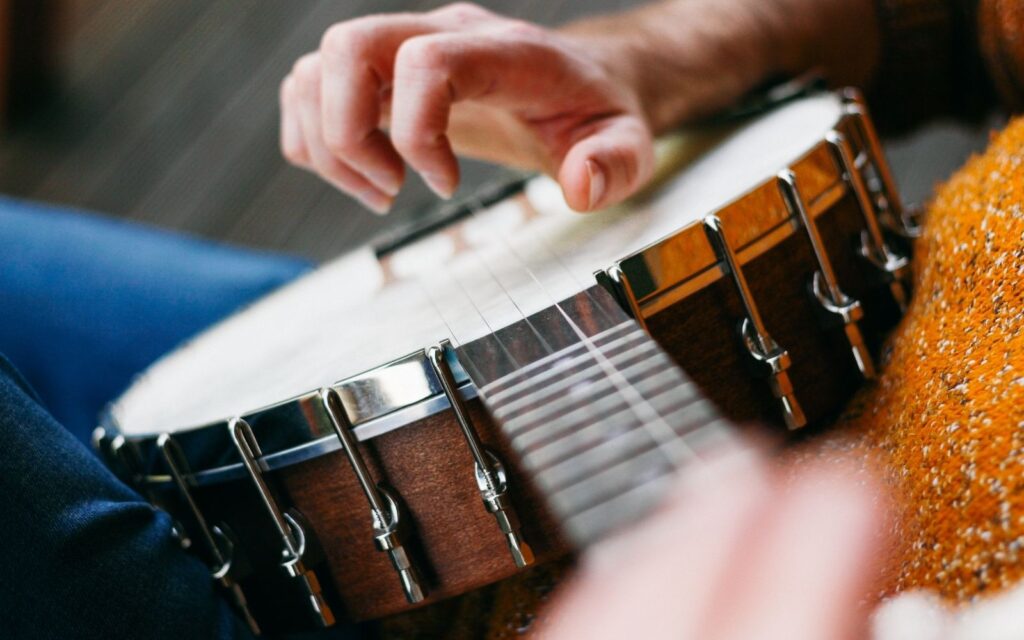
Materials
The best banjos are made from solid woods like maple or mahogany and heavy metals like brass. If you want a banjo that resembles the look and feel of a professional banjo, you’ll want the materials to be top quality, too.
Parts
Unlike many other acoustic instruments, banjos are made of many small parts which all have an effect on the sound and playability. The one part that you should always try to have on intermediate banjos that might not be on beginner banjos is a brass tone ring for a clear, round, and powerful tone.
Size/Weight
Most intermediate banjos are roughly the same size unless you’re looking into a specialty instrument (tenor, ukulele, child size), so the big consideration is the weight. Professional banjos are usually quite heavy because of the solid materials and construction, so that’s what you should look for in an intermediate instrument.
The Overall Tone & Sound
The tone you’re looking for in a banjo depends on the style of music you’re looking for. But, whatever style you want, it should be loud, clear, and with good note separation. For bluegrass, you also want a punchy, growly sound, and for clawhammer, the desirable sound is often described as plunky.
Price
Everybody’s budget is different, and most intermediate banjos come in between $500 and $1,500. Especially if you’re looking in the used market too, this will be enough to find a quality banjo for intermediate or even advanced players.
10 Best Intermediate Banjos
Recording King RK-R35 Madison
- Parts & materials: 3-ply maple rim, cast bronze tone ring, Mastertone style flange
- Weight: 14 lbs
- Style: Resonator
- Best for: Bluegrass
The RK-R35 is a monster of a banjo with several of the same features of Recording King’s higher-end models for a very reasonable price. What you lose with the simple aesthetics, you more than make up for with the solid feel and sound of a good bluegrass banjo.
✅ High-quality parts
✅ Excellent bluegrass sound
✅ Professional feel
✅ Quality construction
❌ Simple style
❌ Heavy
Why I Recommend It
This banjo is a steal at under $1000, and it really gives you the punch and feel of a much more expensive instrument.
Gold Tone BG-150F
- Parts & materials: Maple neck and rim, 14″ mahogany resonator, rolled brass tone ring
- Weight: 8 lbs
- Style: Resonator
- Best for: Bluegrass
The intermediate bluegrass banjo from Gold Tone really packs a punch. A bit lighter weight than their higher-end model, the Gold Tone BG-150F is a great banjo to upgrade to from your beginner model without breaking the bank or your back.
✅ Great sound
✅ Professional feel
✅ Fantastic price
✅ Lighter
❌ A bit plain
❌ Not as loud
Why I Recommend It
I’ve had the pleasure of playing this banjo, and while you wouldn’t mistake it for a high-end professional banjo, it sits in the perfect price range and has many features for an upgrade from your beginner banjo.
Gold Tone Maple Mountain Open Back
- Parts & materials: Maple neck and rim, Planetary tuners, White Ladye tone ring
- Weight: 6.5 lbs
- Style: Open back
- Best for: Old time players
The Gold Tone Maple Mountain Open Back is an extremely solidly-built open back banjo with great sound a good blonde maple look. It feels and looks great and has most of the same tone creating parts as Gold Tone’s higher end clawhammer banjos.
✅ Excellent sound
✅ Solid old time feel
✅ Affordable price
✅ Good look
❌ Inconsistent setup
❌ No accessories
Why I Recommend It
It’a a perfect and affordable open back banjo for intermediate players.
Deering Goodtime Americana
- Parts & materials: 12″ rim, violin grade maple neck and rim, Renaissance head
- Weight: 4 lbs
- Style: Open back
- What’s Included: Banjo
- Best for: Unique clawhammer sound
The Deering Goodtime Americana series from Deering is solidly built in Deering’s main factory, so they’re always immaculately made. Add the unique 12″ head to this open back banjo and you get a deep clawhammer sound with a great bass response.
✅ Great unique sound
✅ Solid feel
✅ Light
✅ Affordable
❌ Quieter
❌ No tone ring
Why I Recommend It
It’s a really well built banjo with a unique sound for clawhammer banjos. It has a deeper, darker tone.
Washburn B16
- Parts & materials: Flamed maple neck and resonator, bell brass tone ring, Planetary tuners
- Weight: 22 lbs
- Style: Resonator
- Best for: Bluegrass
The Washburn B16 is a solid bluegrass banjo with a professional-grade solid wood rim and a brass tone ring that feels solid and gets a great sound for a decent price. It also includes a case.
✅ Case included
✅ Solid materials
✅ Good sound
✅ Affordable
❌ Heavy
❌ Inconsistent setup
Why I Recommend It
This is another great choice for a mid-level bluegrass banjo at a very reasonable price. It’s been used in many places, including in Miranda Lambert’s band.
Gold Tone OB-250
- Parts & materials: Maple neck, rim, and resonator, flat top brass tone ring, Planetary tuners
- Weight: 10 lbs
- Style: Resonator
- Best for: Bluegrass players
The Gold Tone OB-250 is a step up in quality and price from the other banjos on this list. It could very easily be considered a professional banjo, but is still affordable enough for intermediate players. If you want a banjo that’ll last you a long time, this is the one.
✅ Clean bluegrass sound
✅ Well built
✅ Good setup
✅ Nostalgic look
❌ A bit more experience
❌ Heavy
Why I Recommend It
If you’re looking for a real upgrade that will last you for your whole life and sound like a high-class professional banjo, the OB-250 is a fantastic choice.
Gold Tone EB-5
- Parts & materials: Solid mahogany body, 8″ pre-tuned head, Planetary tuners
- Weight: 5lbs
- Style: Electric
- Best for: Intermediate players who want an electric sound
For any player who’s looking to play banjo amplified with a band, the Gold Tone EB-5 is a great, affordable choice while still keeping a great banjo feel. Though not for anybody who wants a traditional bluegrass sound, it’s a very cool option.
✅ Great banjo feel
✅ Solid feel
✅ Unique electric sound
✅ Very affordable
❌ Not for everyone
❌ No acoustic sound
Why I Recommend It
If you’re looking for something that is different, unique, and great with an electric band, you should definitely try out an EB-5.
Recording King OT-25 Madison
- Parts & materials: Maple rim and neck, scooped fretboard, Remo Fiberskyn head, brass tone ring
- Weight: 9.5 lbs
- Style: Open back
- Best for: Clawhammer players
With the solid build and styling of all the RK Madison models, the RK OT-25 really shines for old time playing. It has professional grade materials and is great to play for anyone who wants to upgrade their clawhammer game.
✅ Great clawhammer sound
✅ Well built
✅ Affordable
✅ Authentic look
❌ Heavy
❌ No accessories
Why I Recommend It
It’s another great option with a fantastic clawhammer sound that really knocks it out of the park for old time playing.
Gold Tone CC-100R
- Parts & materials: Maple neck and rim, brass tone ring, guitar style tuners
- Weight: 6.5 lbs
- Style: Resonator
- Best for: Bluegrass on a budget
Gold Tone made their Cripple Creek line of banjos for players on a budget who still want great banjo sounds. The Gold Tone CC-100R lacks some of the more fancy touches like a one piece flange, but still has a great sound and solid build.
✅ Good sound
✅ Cheap price
✅ Solid materials
✅ Solid build
❌ Inconsistent setup
❌ Bad styling
Why I Recommend It
This isn’t a banjo that will stand up to most professional banjos, but it’s a great choice for the intermediate player on a budget.
Best Intermediate Banjo Brands
Many of the best intermediate banjos are from larger companies that do much of their production overseas, usually in Japan, Korea, or China.
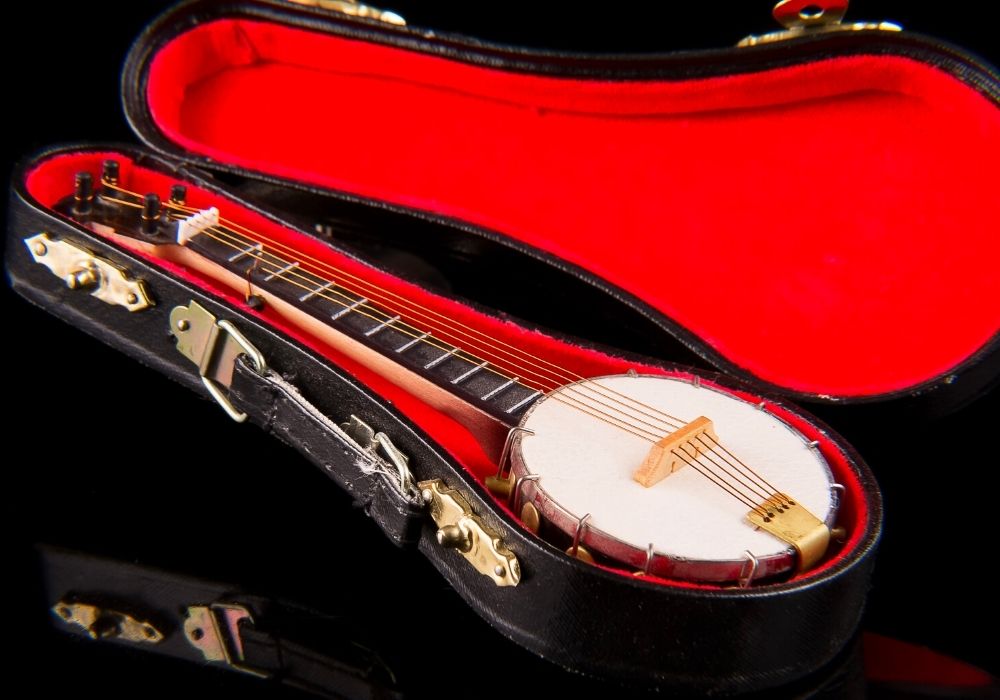
This keeps cost down, and the quality of these instruments can still be quite high, especially in the last two decades.
Gold Tone
Gold Tone Music Group was founded in Florida in 1993 and is now a great company to look for entry-level banjos. Though not the place to look for a high-quality professional banjo, Gold Tone sells solid, reliable entry and intermediate-level instruments.
Recording King
Originally the house brand for Montgomery Ward’s lineup of string instruments in the late 19th century, Recording King has been making instruments for a long time. Their lineup ranges from quality low-cost options to some extremely good professional banjos.
Deering
Deering, founded in 1975 by Greg Deering in California, builds some of the best professional banjos. Also, its line of Goodtime banjos is great for beginners. They have grown into a big organization, but still have an incredible eye for detail and innovation.
Washburn
Since 1883, Washburn has been making string instruments for as long as almost any other company. Now they mostly trade in beginner to intermediate instruments that are affordable and high quality.
Artisan Builders
There are many smaller banjo builders who make professional quality banjos for a bit less than big name brands. They can be great if you’re looking on the high end of intermediate pricing. Some of my favorites are Sullivan, Ome, Nechville, Pisgah, Seeders, and Yates.
Intermediate Banjo Aesthetics and Material
Though often not quite as intricately made as professional banjos, intermediate banjos have a variety of great styles and finishes to choose from.
Wood
Most intermediate banjos are made from solid maple or mahogany, with a few in walnut or cherry. The wood should be chunky and solid, not thin or flimsy at all.
Finish
The wood is usually finished either matte or glossy, and most professional players prefer matte.
Color
The wood on most banjos is stained with natural wood colors and the metalwork is almost always either chrome or, slightly less commonly, gold.
Inlays
One of the more common ways to make a banjo pop are the use of artistic inlays in the fretboard, peg head, or resonator. Many intermediate instruments aren’t too fancy in this area because it increases the cost while not affecting the sound at all.
Buying New vs Used
New banjos are always fun and reliable to purchase, but when looking for intermediate instruments, used can be a great way to go. If you buy used, you can get great vintage professional quality instruments for the price of newer intermediate models.
What’s in the Intermediate Banjo Box?
Many banjos come with various accessories like a bag or case, extra strings or picks, a tuner, a capo, a strap, or sometimes a cleaning cloth and maintenance tools.
Bag or Case
It’s best not to carry around a loose instrument without a case to avoid damage when going from place to place. Many budget banjos come with a lightweight gig bag which is convenient but offers minimal protection. It’s unlikely at this price range to find a hard shell case included.
Strap
If you’re planning on playing standing up or sitting down with a lighter instrument, it’s useful to have a strap. Many banjos come with a strap included and they come in two styles: clip-on or cradle straps.
Picks
For bluegrass-style playing, a thumb pick and finger picks are a must. Some banjos come with a set included. If not, look for picks made by Dunlop or National.
Strings
Most banjos come with strings already attached, but with the bridge (a small wooden arched saddle the strings sit on) not placed under them yet. Some, though, come with a replacement set of strings for when they break or your first set is getting old.
Tuner
A clip-on electric tuner is a convenient and easy way to check the tuning on any string instrument, and many banjos include one in the package. If it doesn’t, don’t fret, though, because your phone almost certainly can download a free tuning app.
Extras
Other extras that may be included or that you might need to buy yourself are a stand, cleaning cloth, capo, or tools to adjust and maintain your banjo.
Intermediate Banjo Brands to Avoid
When buying any banjo, and especially intermediate banjos, try to avoid buying from any brand without a proven track record. Also, generally avoid brands that are mostly known for their guitars or other instruments and have very few banjo models.
Frequently Asked Questions:
Here are some answers to commonly asked questions.
How Much Do Intermediate Banjos Cost?
Most intermediate banjos cost between $500 and $1,500. This price can vary depending on the type of banjo you’re looking for and whether you’re buying new or used, but quality instruments can be found all across the spectrum if you know what to look for.
What Are the Best Intermediate Banjos?
Gold Tone BG 150F: Best for Bluegrass
One of my students has this banjo. It’s built like a tank and has a great, professional quality bluegrass punch to it.
Gold Tone Maple Mountain Open Back: Best for Clawhammer
Another relatively affordable gem from Gold Tone, the Maple Mountain features most of the same elements from their more expensive banjos for well under $1,000, making this a bargain.
Deering Sierra: Best for Bluegrass Players in It for the Long Haul
If you’re an intermediate player and know you plan to stick with it, it might be worth it to splurge on the real deal and get a Deering Sierra. This banjo has a great feel for intermediate players and is all the banjo professional players would need, too.
Where Are the Best Intermediate Banjos Made?
Many of the best intermediate banjos are manufactured in Asia and assembled in America, but some of the higher end models are made 100% in the USA.
What Is the Best Sounding Intermediate Banjo?
The best sounding intermediate banjo is the Gold Tone BG 150F.
Where to Buy Intermediate Banjos
Online retailers like Amazon or Guitar Center can be great places to find variety, low prices, and great return policies, though sometimes can be hard to sort through. On the other hand, buying in-store might be less convenient and a bit pricier, but you can ask questions, try out a few instruments, and meet other local musicians.
Amazon
It’s hard to beat the prices and selection for anything on Amazon, and that includes if you’re looking for instruments. Amazon offers a wide range of banjos under $500, easy no hassle returns, quick shipping, and often the best prices.
Online Music Retailers
In addition to Amazon, other online retailers like Musician’s Friend, Guitar Center, or Sweetwater all offer convenience, low prices, and a wide selection. On top of that, with dedicated music retailers you often get more detailed information and a site dedicated to nothing but music gear, so there’s less noise to sift through.
Your Local Music Store
If you’re looking for some person to person communication, you can’t beat your local music store if you have access to one. Most stores have a selection of instruments to try, friendly staff to answer questions, and even lessons or community events you can attend.
Review This Post
Table of Contents
- Banjos
- What Is an Intermediate Banjo?
- Types of Intermediate Banjos
- What to Consider When Choosing an Intermediate Banjo
- 10 Best Intermediate Banjos
- Best Intermediate Banjo Brands
- Intermediate Banjo Aesthetics and Material
- Buying New vs Used
- What’s in the Intermediate Banjo Box?
- Intermediate Banjo Brands to Avoid
- Frequently Asked Questions:
In Conclusion
Thanks for reading about the best intermediate banjos in today’s article. I hope you learned a lot about finding the next instrument on your banjo journey.
Feel free to leave a comment below if you have any questions, comments, or info about your favorite banjos. Thanks again!



